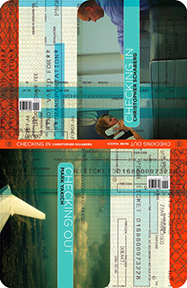The first time I fell in love with a fellow passenger was in 2002. It happened on a tiny plane that I boarded at the Houston airport (a layover from L.A.) en route to Raleigh where my cousin was marrying a pretty, redheaded girl.
G was a giant. He must’ve been about seven feet tall, had huge legs that were cramped up against the seat in front of him, light brown hair, glasses, and was wearing a suit and tie.
“What kind of name is G?” I asked when he introduced himself.
I had just bumped my head while diving for my seat by the window, and he had laughed.
“Is your head okay?” he replied.
“What kind of name is G?” I asked again so he’d forget my embarrassing clumsiness.
I was instantly attracted to him.
He was much older than me, probably late 30s or early 40s, and I wasn’t yet 20.
“That’s just my lot in life,” he said. “My name’s G. Just G.”
“Is it short for something?” I said, and then guessed the G names I knew. Greg, Gabe, George, Geoffery.
He chuckled each time, shaking his head. “It’s just G, I promise.” Then he brought out his business card to prove his point. There it was: a big, bold letter G.
I don’t remember his last name because I only saw the card quickly and then he put it away in his pocket. If I had remembered his last name, surely I would’ve found him on Facebook by now.
What has made me remember G all these years besides his unusual, one-letter name, his Southern drawl, his large body, and the fact that he showed me a fascinating card trick (which I don’t remember either), was that he was the first person to introduce the concept of polyamory to me.
“So let me show you around Raleigh,” he said, after he’d had a few cocktails and we’d talked the hell out of Florence, where I’d just studied Italian for three months.
I had a boyfriend at home in L.A. and would be spending all my time with family when we landed, but I wanted to go with him anyway. Something was exciting about G and I couldn’t quite figure it out. Maybe it was because in those days, and sometimes even now, I find making conversation a tedious task; but with G it just flowed.
“Hmm,” I hesitated.
What really held me back from saying Yes, show me Raleigh! was the ring on his left hand.
“But you’re married,” I said.
“Do you know what a unity candle is?”
I shook my head. “No.”
“When you get married, there’s this ritual with candles. Someone goes up to the altar and lights two candles and leaves one unlit between them.” He held up one finger. “The bride and groom then take those two lit candles, light the one in the middle, and then most of the time they blow out the original candles. This symbolizes that their individual lives are now part of the past and everything from then on will be shared. You follow?”
I nodded.
“Once in a while, though, a bride and groom can leave their original candles lit. This means that we respect each other’s individuality and continue to lead separate lives in addition to our life together. My wife and I love each other and this is what works for us.”
I thought of everything I knew about marriage. And deep down, though I had never admitted it, I always felt it was unnatural to pick one person forever when there were so many wonderful people in the world. My attitude about monogamy has constantly shifted since then, but when G said this to me, it was the first time that I considered this exciting new way of loving someone. Or several someones.
We both smiled at the same time. I didn’t think then that this was some cheating bastard’s way of getting a 19-year-old girl into bed. I hadn’t yet been brainwashed by too many gossip magazines and sitcoms to think that all men were bad and out to fuck over women. I trusted what G said and thought it sounded pretty awesome.
“So let me take you around Raleigh?”
“Ok, maybe.” I said.
He scrawled his number on a cocktail napkin and gave it to me and we continued talking and laughing for the leg of our flight.
When we landed, we deplaned and as I said goodbye to G, telling him I’d call, my older brother who had been sitting in front of us the whole time went straight over to the giant and said, “Dude, you haven’t got a chance in hell.”
“Gabe!” I yelled.
But G, who towered over Gabe, kept his cool. “I didn’t mean any harm, man.” He smiled at me, waved, and made his way to the exit.
“He’s a bad guy, Erica. I heard him the entire time,” Gabe insisted.
I just shook my head at him.
When we left the airport, I told all my family members about G, and they pretty much agreed with my brother. But they hadn’t seen his smile. They hadn’t seen his eyes. I refused to tarnish my perception of this man for what he’d given me—a new perspective.
I never did call him and I lost the number long ago. But when my cousins blew out their individual candles at that wedding in Raleigh, I quietly laughed to myself.
Erica Garza is a writer and traveler with a current Los Angeles address. She holds an MFA in Writing from Columbia University and has been published by Hot Metal Bridge, the literary magazine of the University of Pittsburgh.






